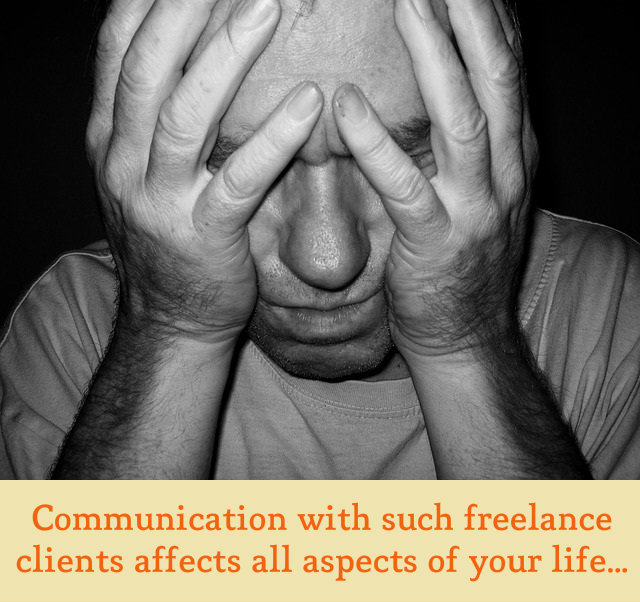 We have all had clients (or prospects) who don’t know what they want, what the purpose of their project is or why they need a freelancer at all. But they have requirements, and a lot of them! Those requirements may be vague or very specific… although out of context. The question is – how do we work with such a freelance client?
We have all had clients (or prospects) who don’t know what they want, what the purpose of their project is or why they need a freelancer at all. But they have requirements, and a lot of them! Those requirements may be vague or very specific… although out of context. The question is – how do we work with such a freelance client?
The short answer is – you do not work with such a freelance client 😀
I’ve had a couple of bad clients like that. One was really incompetent, maybe even a little bit stupid. I worked with him almost for a year – it was tiring.
The other client was very competent and was great at her job. She just didn’t know what she wanted which in turn lead to poor communication of her expectations of me. I worked with her only for a few weeks before I decided to put an end to it. It was less tiring because I already knew what to do when I saw the first signs of mismatch.
From working with the above two freelance clients, I learned a very valuable lesson – stay away from clients who don’t know what they want; who cannot articulate what their requirements and/or expectations are; who ask irrelevant questions or even worse, questions which have nothing to do with your work and/or the project; who think everything happens “real quick” and right away, effortlessly…
If you feel even for a second your prospect or client is like that – incompetent, stupid, arrogant, illiterate, always without a purpose or a goal in mind (or worst case scenario – all of the above) – run. Even if you find a way to work well with them here and now, it won’t last for long…
You are patient, you explain everything very carefully, always available and willing to help, you adopt different approaches to explain the same thing until the client gets it. That’s excellent – kudos to you! But is this your job? If not, I bet soon enough you’d feel very tired and sick of being patient and all helpful.
Sure, you mastered the skill of effective communication with clients – but shouldn’t you be using that skill toward building relationship with clients who appreciate your work and competence; you know – not clients who really like the way you explain how to turn their computer on?
No matter how well a freelance client pays, it does not justify putting up with their poor communication skills.
 Working with a freelance client like that is exhausting. It sometimes even makes you feel somewhat guilty – because you are smart and the client isn’t. You might even feel working with them is some kind of a punishment – and you are putting up with the work, waiting for your punishment to be over.
Working with a freelance client like that is exhausting. It sometimes even makes you feel somewhat guilty – because you are smart and the client isn’t. You might even feel working with them is some kind of a punishment – and you are putting up with the work, waiting for your punishment to be over.
Communication with such freelance clients affects all aspects of your life, not only your work on that specific project. Remember that your health and work-life balance are way more important than the extra money you’d make if you keep working with this freelance client, no matter how much they pay.
It’s good if you spot the red flags during the preliminary conversations or your freelance interview. But if you somehow missed that and did enter a contract with such a freelance client – don’t fret! I Read on.
If you have entered a contract with a freelance client who happened to be a bad one…
Make a plan how to get rid of them! I know you’d want to just throw in the towel and leave – but that’s not professional. No client deserves to be deserted mid-project with no explanation whatsoever.
So keep calm and think it through. Here are a few questions to ask yourself when assessing the situation and looking for a way out.
Q1: Is this a long-term freelance project or a one-time (or trial) assignment?
If it’s a one-time project or a trial assignment – you are in luck. As soon as you complete the project, you can move on.
Don’t insult the client but don’t just leave either. Explain your reasoning – e.g. you have decided the work on their project is not what you thought and it is not suitable for your current goals and availability. After all, that’s why you have a trial – to make sure you and the client are a good match, and the project is what you want.
If the client has hired you on a long-term project, then it’s more complicated. You should part ways with your client without insulting them – after all, you do want a recommendation from them, right? However, you also need to be clear there is nothing they can do to keep you on the team.
Don’t forget those things which you should never tell a client and remember that each case is very specific and calls for an individual approach – depending on the client, on your relationship with them, on your role in their project and team, etc.
It’s a good rule of thumb to focus your reasons for ending the contract away from their poor communication skills and to your priorities and career plans.
 For example, you were re-evaluating your workload and you realized this project is too monotonous for you. It doesn’t challenge you and you don’t improve your skills – so the client will be better off hiring someone else who will be more enthusiastic about their project. (See, you are doing them a favor by freeing up a place for a more eager to work freelancer!)
For example, you were re-evaluating your workload and you realized this project is too monotonous for you. It doesn’t challenge you and you don’t improve your skills – so the client will be better off hiring someone else who will be more enthusiastic about their project. (See, you are doing them a favor by freeing up a place for a more eager to work freelancer!)
Another example, you were re-evaluating your availability and you realized you were overloaded and on the verge of a burn out. So you prefer to make a step back and take short small scale projects while you figure out what you want to do. Hence, your desire to end this long-term high workload contract with the client.
Needless to say that whatever reason you give the client, it shouldn’t be a lie. Sure, you don’t tell them in their face you hate working with them because their communication sucks. But this doesn’t mean you should lie to them. Tell them the truth – give them that other reason you have to end the contract, which would not be so hurtful to them and really has more to do with you than with the client.
Of course, there is always a chance your client will not understand what you are saying and will get offended. To get on their good side, offer them your help to find and train a replacement who will do your job once you end your contract.
Q2: How fast I can get feedback and/or edit requests?
This is a question you have to ask yourself if your problem with the client is because of delayed or no feedback on your work. You know already every situation is different and calls for an individual approach. Start by reading an old post here – about dealing with difficult clients. Then focus on your client’s qualities and perception in terms of feedback and why it should matter to them.
Ask yourself – what is the single most important thing that my client cares about?
Is it the product quality? Is it the deadline? Is it the price? Is it what people think of them? Find that single most important thing that makes them click and use it to get your feedback, and now.
For example, if the client cares about the deadline and doesn’t want to see any delays in the project under no circumstances, tell them the lack of feedback for your work prevents you from completing the project on time. Explain that if he wants to have a complete project on time, he must send you his feedback within X days after you ask for it. It’s been Y days already…
If the client cares most about what people think about him, tell him he makes you feel bad – when he doesn’t send you feedback, it appears as if he doesn’t care what you do or if you’ll do your job at all. Tell him that timely feedback is paramount for the project success and when he doesn’t send you proper feedback on time, it looks as if he doesn’t hold their end of the deal and sabotages your work.
If the client cares most about the price and fitting in the budget, tell them that delays in feedback leads to overtime work and prolong working period – which potentially will lead to increased expenses in the long run. So if they want to fit in the budget, they should start sending feedback in a timely manner.
And so on – you get the idea. You shouldn’t be rude or arrogant in any way – but you should be firm.
Q3: How complex is the task and how fast can you complete it?
This is a very specific question – it can be tomorrow, or in a month. In any case though, remember that your decision to end the contract may come as a surprise to your client. Give them time to think it through and understand why you decided to part ways; to find a replacement; to feel ok with your decision.
If the situation has escalated and you want to part ways because you can’t stand working another minute with this person, then you can end it starting today. But then you risk not getting a recommendation or even worse, getting a bad review among clients, no matter how well you did your job.
Remember what matters – it’s your work-life balance and your peace of mind. There always will be bad clients. You will always have to end a contract for one reason or another. My advice is to not wait until the last moment when you already cannot stand your client – try and fix your relationship early or end the contract way ahead of time.
So what’s the bottom line?
It isn’t worth it trying to please someone who doesn’t really know what they want.
Truth is, if someone doesn’t know what they want, they will never understand what you are trying to explain – no matter the approach you choose or how patient and willing to help you are.
There are plenty of freelance clients out there. If you want to be happy with what you do and to maintain a work-life balance, you have to take into consideration your skills, requirements and expectations of level of communication skills. Avoiding freelance clients who aren’t a good fit for you is one of the keys to your freelance success.





Diana
I’m just one in a very long line of freelancers, who’s had their fair share of duff clients.
Fortunately, you do get better at spotting those red flags with time. So you don’t have to worry about ditching bad clients quite so often.
I now know to avoid start-up ventures. Rarely do these clients ever know what they want or what they’re doing. And they never have the funds to pay you the proper going rate either.
And if a prospect’s communication is poor before they become a client, the pattern is almost guaranteed to continue once they do become one. In other words, avoid like the plague.
Hi, Kevin – what’s a “duff client”? Maybe this is an idiom i didn’t know but Google didn’t know it either LOL
Good point about startups – i disagree they don’t know what they are doing (there are startup owners who do know 😉 but you are 100% right that probably they don’t have the money… So unless it’s an idea or innovation you want to be in even without the money, don’t get on board. Thanks for the addition.
And regarding the communication remark – yes, i totally agree. I try to say it less as i am starting to sound as a broken record but yes, communication skills is a must.
And by the way, something i realized just recently – it’s not about good or bad communication skills; it’s about suitable communication styles and skills. What is a client with bad communication for me may be a client with excellent communication skills for you or somebody else out there.
Hi Diana
Shame ‘duff’ isn’t commonly used outside the UK, as it’s the perfect word to describe certain clients.
It’s a hard word to explain or translate. But it kinda means ‘dodgy’, ‘low-grade’ or ‘dysfunctional’ – although none of these alternatives give the meaning full justice.
I sure you’re right that some start-ups do know what they’re doing. It just hasn’t been my own experience so far.
I see, thanks for the ‘duff’ explanation, Kevin – i get it now 😀 and i know what you mean about the startups, to be honest – i share your experience… ha!
I guess i decided to stand up for all startup enthusiasts who do know what they want (i am one of them LOL) – but unfortunately, even when we know what we want, more often than not we lack the funding needed to hire the services of a top notch freelancer 😉
Hi Diana,
I have requested my client to END the contract because of the terms of oDesk review; as they want me to complete all the works at an earliest, there was no other reason.
After successful completion of the work (before due date) I earnestly requested the client to end the contract. The client ended the contract with a poor feedback of 2.70 (that was very poor in my oDesk tenure). And he replied: ‘I have ended the contract. Also I’m not upset at all! I thank you for all work you do’.
Again I send him a message: ‘Would you please revise the feedback you have given to me? I think I do not deserve such a poor feedback as you were satisfied on my work and allowed me a bonus for timely completion of the work.It is important for me and this feedback will effect me a lot in oDesk market place’.
He revised the feedback to 3.85 and made a hidden comment for oDesk.
What you think? Is it a problem for me when I’m passing hard time(review) with oDesk?
https://www.odesk.com/users/~01a45151d0a316d6f5
Thanks,
Hi, Rafiqul – I see you have overall feedback on your profile is quite good (4.79) and the project you describe was short and/or for relatively small amount of money – which means it won’t have much influence on the overall rating on your profile.
I would suggest you accept the feedback and just move on. You can talk to that client and find out why they left this rating – maybe they were happy with the fact that you completed the work before the deadline but they were not that happy with the quality or your communication skills or your responsiveness or something else?
I wouldn’t waste my time fighting a wrongful feedback but I would invest some time investigating and finding out the reasons for it. Learn from it and improve.
Hope this helps!
~Diana
Hello Diana, thanks for your brief reply spending your valuable time.
In the mean time I have accepted the feedback and give up the matter from my head. I would like to inform you that I have overcome oDesk verification that I was worried and informed you earlier.
It is pertinent to mention that you are doing an excellent job through your blog. Perhaps a lot of people like me are getting help from you and your blog.
Thanks,
Glad you resolved the issue, Rafiqul, in a way that satisfies you. And thanks for the positive feedback – hope the blog will continue helping you in the long run 😀